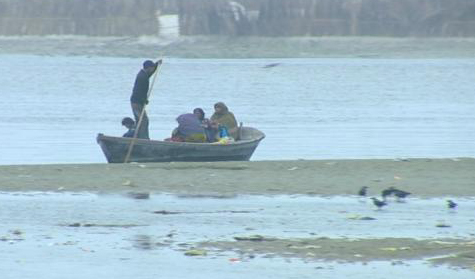
Lucknow, September 2: Muslim religious leaders have now come forward to extend a helping hand to sadhus and seers who are campaigning for conservation of River Ganga.
Maulana Saeedur Rehman, principal of Centre of Islamic studies, said that it is well known that Ganga is associated with the faith of Hindus but it is not any less important for Muslims.
Terming the drive to clean the river as a "holy campaign", Rehman said that he would not only extend support to it but would do whatever was required in achieving it.
Member of All India Muslim Personal Law Board Maulana Khalid Rashid Firangimahli said that Ganga is a national river and it is not just the Hindus but also the Muslims who live on its banks and earn livelihood through it so it is the duty of all to protect and save it.
Pledging support in this campaign, Firangimahli also appealed to all Muslims to contribute to achieve this goal and asked the central government to create a new ministry for conservation of rivers and look for alternatives of bridges on the Ganga.
Convenor of Ganga Mukti Sangram Acharya Pramod Krishnan said that he has got assurance from various Muslim leaders during his meetings with them here earlier this week on joining hands in the conservation work to involve the common man.
"The failure of various projects to make Ganga pollution-free following rampant corruption proves that only the involvement of common people of the country can save the river and the support of Muslims in this task is equally important," Krishnan.
Krishnan, who met and sought the help Rehman, leading Shia scholar Maulana Kalbe Jawwad and Firangimahli, said they readily extended support for the cause.
"Soon we will sit together and formulate a joint work plan and also visit the areas on the banks of the river to create public awareness," Krishnan said.
Noted Shia scholar Maulana Kalbe Jawwad supported the drive and said that he would join the saints and mahants in this task where ever required.
On the reasons for seeking the support of Muslims, Krishnan said that it was also to instill among them the confidence that this is a totally non-political move and the issue is one concerning all the people of the country.
Accusing BJP of associating the issue with a particular community in order to gain political mileage, he said that it showed their opportunism.
Citing National Evironmental Engineering Research Institute (NEERI), he said that oxygen and other vital contents in the Ganga are getting destroyed gradually because of the seven bridges on the Ganga and there is still a proposal of 39 more bridges on it.
On one hand government funds are used on building bridges and on the other thousands of crores of rupees are wasted in the name of save Ganga project, he said.
"If the river is made free of bridges it would become pollution free," he claimed, adding that in the past four years more than Rs 10 thousand crore have been spent on Save Ganga works but the state of the river has gone from bad to worse.
Accusing the central and state governments of being responsible for misuse of funds, he also demanded a high level inquiry into it.





Comments
Add new comment